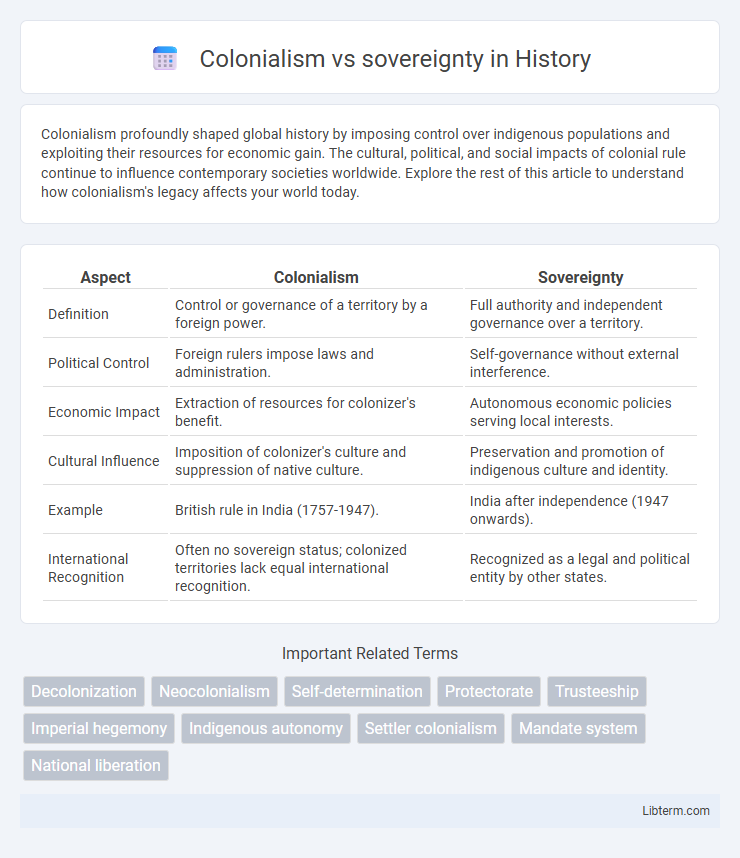Colonialism profoundly shaped global history by imposing control over indigenous populations and exploiting their resources for economic gain. The cultural, political, and social impacts of colonial rule continue to influence contemporary societies worldwide. Explore the rest of this article to understand how colonialism's legacy affects your world today.
Table of Comparison
| Aspect | Colonialism | Sovereignty |
|---|---|---|
| Definition | Control or governance of a territory by a foreign power. | Full authority and independent governance over a territory. |
| Political Control | Foreign rulers impose laws and administration. | Self-governance without external interference. |
| Economic Impact | Extraction of resources for colonizer's benefit. | Autonomous economic policies serving local interests. |
| Cultural Influence | Imposition of colonizer's culture and suppression of native culture. | Preservation and promotion of indigenous culture and identity. |
| Example | British rule in India (1757-1947). | India after independence (1947 onwards). |
| International Recognition | Often no sovereign status; colonized territories lack equal international recognition. | Recognized as a legal and political entity by other states. |
Understanding Colonialism: Definition and Core Concepts
Colonialism refers to the practice of acquiring control over another territory, often by settlement and economic exploitation, fundamentally undermining the sovereignty of indigenous populations. It involves the imposition of external political, social, and cultural structures that disrupt self-governance and local autonomy. Key concepts include domination, resource extraction, cultural assimilation, and the denial of native peoples' rights to self-determination.
Defining Sovereignty: Historical Evolution and Meaning
Sovereignty historically evolved from the absolute authority of monarchs to the modern principle of state autonomy recognized under international law. The Peace of Westphalia in 1648 marked a pivotal moment by establishing territorial integrity and non-interference as core components of sovereignty. This concept contrasts with colonialism, where external powers imposed control, undermining indigenous states' self-governance and autonomy.
Colonialism’s Impact on National Identity
Colonialism significantly disrupted national identity by imposing foreign cultural, political, and economic systems that undermined indigenous structures and traditions. The colonial legacy often led to fragmented societies, where imposed borders and governance weakened pre-existing ethnic and cultural unity. Efforts to reclaim sovereignty involve reviving native languages, customs, and governance models to restore a cohesive national identity and counteract colonial-era assimilation pressures.
The Struggle for Sovereignty in Colonized Regions
The struggle for sovereignty in colonized regions involved persistent resistance against foreign control, aiming to reclaim political autonomy and cultural identity. Key movements, such as India's fight for independence under leaders like Mahatma Gandhi and Africa's decolonization efforts led by figures like Kwame Nkrumah, highlighted the demand for self-governance and the rejection of colonial imposition. These efforts reshaped international relations and led to the emergence of new nation-states asserting their sovereignty on the global stage.
Legal Frameworks: Colonial Laws vs Sovereign Rights
Colonial laws often imposed foreign legal systems that undermined indigenous governance and restricted sovereign rights, leading to long-term challenges in asserting self-determination. Sovereign rights are grounded in international legal frameworks such as the United Nations Charter, which affirms the principles of territorial integrity and political independence. The tension between colonial legal impositions and the restoration of sovereign rights remains a critical issue in post-colonial state-building and international law.
Economic Consequences of Colonial Rule
Colonial rule often disrupted indigenous economies through resource extraction and imposition of export-oriented cash crops, resulting in long-term economic dependency. The monopolization of trade and exploitation of local labor under colonial regimes suppressed native entrepreneurship and economic diversification. Post-colonial states frequently inherited underdeveloped infrastructure and skewed economic structures, hindering sustainable economic sovereignty.
Paths to Sovereignty: Decolonization and Independence Movements
Decolonization marked a pivotal shift as former colonies pursued sovereignty through independence movements driven by nationalist ideologies and anti-colonial struggles. Key paths to sovereignty involved negotiated withdrawals, armed resistance, and international support via organizations like the United Nations advocating self-determination. Successful independence movements reshaped political landscapes by establishing autonomous governance, asserting cultural identity, and challenging imperial legacies.
Contemporary Legacies of Colonialism on Modern States
Contemporary legacies of colonialism profoundly affect modern states by shaping economic disparities, political structures, and social inequalities rooted in historic exploitation and domination. Post-colonial states often struggle with fragmented governance and contested sovereignty due to arbitrary borders drawn during colonial rule. Enduring challenges include resource extraction patterns favoring former colonial powers and socio-political instability linked to imposed colonial identities.
Sovereignty Challenges in a Post-Colonial World
Sovereignty challenges in a post-colonial world often stem from weakened state institutions, economic dependencies, and external interventions influenced by former colonial powers. Many nations struggle to assert full political and economic autonomy due to neocolonial practices, including unequal trade agreements and multinational corporate influence. Persistent border disputes and internal conflicts further complicate efforts to establish stable, recognized sovereignty in post-colonial states.
Towards True Autonomy: Reclaiming Sovereignty After Colonialism
Reclaiming sovereignty after colonialism involves dismantling imposed political structures and restoring indigenous governance systems that reflect the true autonomy of formerly colonized nations. True autonomy requires legal, economic, and cultural self-determination, enabling nations to exercise full control over their resources, laws, and identity without external interference. Advancing sovereignty post-colonialism is essential for addressing historical injustices and creating sustainable development rooted in local priorities and values.
Colonialism Infographic

 libterm.com
libterm.com